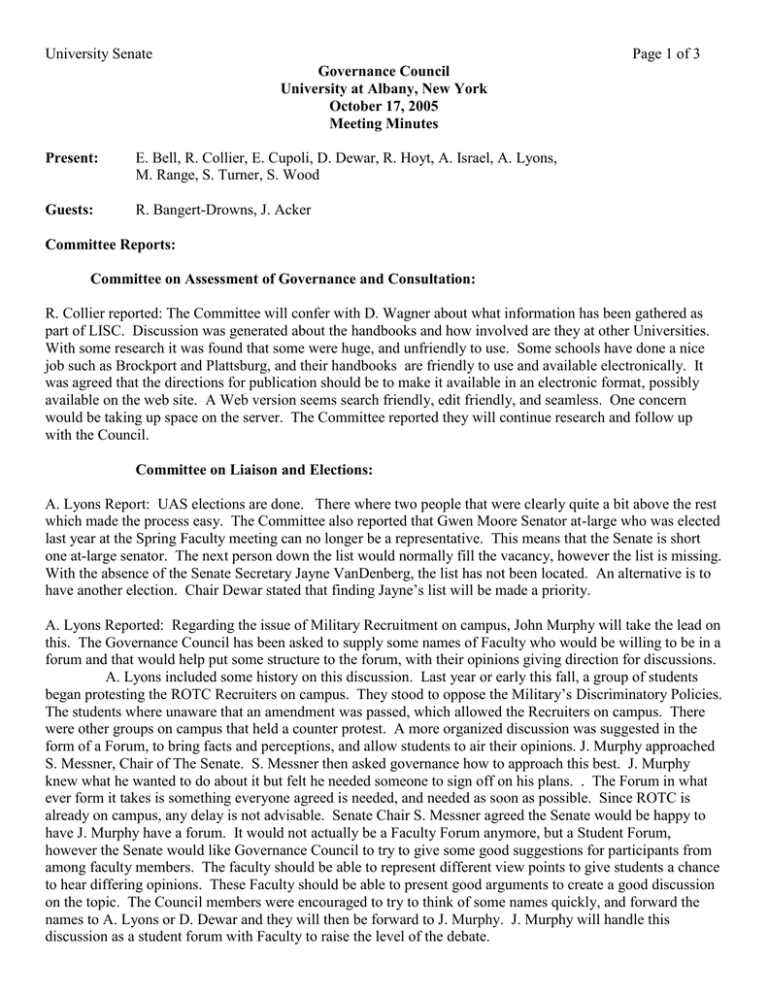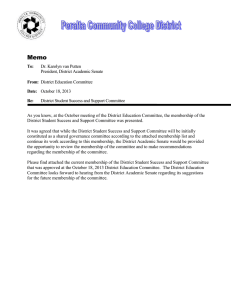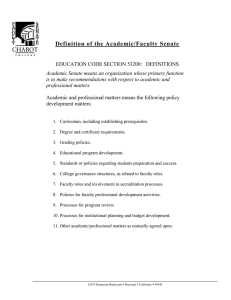University Senate Page 1 of 3
advertisement

University Senate Page 1 of 3 Governance Council University at Albany, New York October 17, 2005 Meeting Minutes Present: E. Bell, R. Collier, E. Cupoli, D. Dewar, R. Hoyt, A. Israel, A. Lyons, M. Range, S. Turner, S. Wood Guests: R. Bangert-Drowns, J. Acker Committee Reports: Committee on Assessment of Governance and Consultation: R. Collier reported: The Committee will confer with D. Wagner about what information has been gathered as part of LISC. Discussion was generated about the handbooks and how involved are they at other Universities. With some research it was found that some were huge, and unfriendly to use. Some schools have done a nice job such as Brockport and Plattsburg, and their handbooks are friendly to use and available electronically. It was agreed that the directions for publication should be to make it available in an electronic format, possibly available on the web site. A Web version seems search friendly, edit friendly, and seamless. One concern would be taking up space on the server. The Committee reported they will continue research and follow up with the Council. Committee on Liaison and Elections: A. Lyons Report: UAS elections are done. There where two people that were clearly quite a bit above the rest which made the process easy. The Committee also reported that Gwen Moore Senator at-large who was elected last year at the Spring Faculty meeting can no longer be a representative. This means that the Senate is short one at-large senator. The next person down the list would normally fill the vacancy, however the list is missing. With the absence of the Senate Secretary Jayne VanDenberg, the list has not been located. An alternative is to have another election. Chair Dewar stated that finding Jayne’s list will be made a priority. A. Lyons Reported: Regarding the issue of Military Recruitment on campus, John Murphy will take the lead on this. The Governance Council has been asked to supply some names of Faculty who would be willing to be in a forum and that would help put some structure to the forum, with their opinions giving direction for discussions. A. Lyons included some history on this discussion. Last year or early this fall, a group of students began protesting the ROTC Recruiters on campus. They stood to oppose the Military’s Discriminatory Policies. The students where unaware that an amendment was passed, which allowed the Recruiters on campus. There were other groups on campus that held a counter protest. A more organized discussion was suggested in the form of a Forum, to bring facts and perceptions, and allow students to air their opinions. J. Murphy approached S. Messner, Chair of The Senate. S. Messner then asked governance how to approach this best. J. Murphy knew what he wanted to do about it but felt he needed someone to sign off on his plans. . The Forum in what ever form it takes is something everyone agreed is needed, and needed as soon as possible. Since ROTC is already on campus, any delay is not advisable. Senate Chair S. Messner agreed the Senate would be happy to have J. Murphy have a forum. It would not actually be a Faculty Forum anymore, but a Student Forum, however the Senate would like Governance Council to try to give some good suggestions for participants from among faculty members. The faculty should be able to represent different view points to give students a chance to hear differing opinions. These Faculty should be able to present good arguments to create a good discussion on the topic. The Council members were encouraged to try to think of some names quickly, and forward the names to A. Lyons or D. Dewar and they will then be forward to J. Murphy. J. Murphy will handle this discussion as a student forum with Faculty to raise the level of the debate. University Senate Page 2 of 3 Council Members were reminded that the Senate is seeking Students and Faculty participation at the next Senate meeting to discuss the Holiday Schedule. New Business: a. Representation and voting rights for the School of Public Health Faculty Much Discussion focused on the contributions of E. Bell concerning the unique position that the School of Public Health is in, and the current guidelines for Senate Voting Rights as well as the probability that there will need to be changes in the guidelines, in order to get fair representation. Most of the Faculty are not paid by the University, and are therefore, not in the Human Resources list of eligible voters. The Faculty also work at many different levels, often volunteering for responsibilities, including teaching one or more classes a semester. Respect should be given to these colleagues by a representation in the Senate Vote. This led the discussion to comparable colleges, such as CNSE, which is much smaller, but the School of Public Health was identified as unique in its current situation. They believe they have enough faculty now, to obtain a third Senator, and that is in process. However, the current guidelines do not sufficiently represent the needs of the School. The current guideline of obtaining the list from Human Resources, which excludes all part time and adjunct faculty, cannot take into consideration the faculty working through the Department of Health. But how should they determine how many this school should have. It was noted that part time Faculty are paid through University and they have rights. They don’t have voting rights for Faculty issues, but they still have representation. If the Department of Health faculty have no rights, they should still have some representation. Adding at large representatives was suggested. Talk included the possibility of voting per bargaining units. These are UUP, CSEA and PEF. Under the new bylaws schools and colleges are given more autonomy regarding how to apportion senators. Another possibility was to give voting rights by departments or units. Whatever the current University By-Laws now describe as how voting eligibility is currently in effect at the School of Public Health. However, because all employees are or were at one time full DOH employees, they are not eligible for voting rights by the current By-Laws, even though teaching is considered part of their jobs. Having a full school with full academic credentials, but many not paid through the University needs a new approach. This situation creates all kinds of NEW issues. This sets new precedents. Different Colleges were discussed, including the Writers Institute and The School of Social Welfare. It is believed that changing By-Laws will impact other schools, not just the School of Public Health. It was discussed to try to identify the sub-groups eligible for voting rights, and try to find equitable balance. Groups that are affected should take on a challenge to work out definitions, guidelines and expectations, to reduce the likelihood of chaotic definitions. Then the groups could propose options to the Governance Council and justify their recommendations. There is a lot of difficulty in codifying the overloads that DOH employees do. Working in a department where they regularly overload, adding these responsibilities into a definition could backfire on the faculty. There is a 10 year approval, for promotion, with course load being outlined within departmental norm. The Council Chair D. Dewar, will do homework and see what we are working with regarding faculty and staff and suggested a follow-up on legal opinions that seem to be out there, that says The Department of Health faculty are voting faculty. The Council will look for something in writing on what is really considered faculty status, and seek opinions from School of Public Health to see what they really need. University Senate Page 3 of 3 b. Presentation by Professors Acker and Bangert-Drowns on the findings of the Ad-Hoc University-Wide Governance Committee. Ad Hoc University Wide Governance Committee: Discussion revolved around talk about what should be done with this document. Many good issues where evaluated, and the Council needs to see where they should go with this. Should there be a more formal survey done? Were there possibly response problems from the informal survey done? The Document submitted by the Committee was very detailed, and obviously involved much work. R. Bangert-Drowns began the discussion: Professor Bangert-Drowns re-enforced the point that the work of this committee not get lost. The Committee was convened in the summer of 2004. They were convened in response to the creation of the new college of CNSE and charged not to address the schools of new college specifically, but governance in general. Thirteen members met twenty one times, there were subcommittee meetings, outside of larger meetings, all of which where active and labor intensive. The most valuable thing they learned was an awareness of the differences among the cultures of the schools. First, they learned a lot about each others colleges and schools. Second, they learned that integration at school and college levels is not clear and well defined. Many points where redundant, or contradictory, depending on how well coordinated they were. Third the numbers of recommendations that were received, many of them are conscientious and helpful and have been summarized in the document. From last spring’s survey, there were 260 faculty responses. These responses where consistent with the recommendations of the Ad Hoc Committee. A large group of faculty would like to keep a running understanding in the Ad Hoc Committee. They would like to see this as not the end of something, but the beginning of something. It was suggested that the Senate should help promote the recommendations, and take to them to the appropriate committee or subcommittee. Then, these committees can be given a specific charge, and investigate different models, of schools as represented by the Senate. The Council began a discussion on some of the recommendations put forth in the handout presented by the Committee. The Council suggested that the informal survey would be more useful if it is followed up by a new and broader survey. R. Bangert-Drowns talked about the research done on tenure and promotion, which produced a report. The report was followed by a forum. The forum was followed by an informal survey. And it concluded that there is a rational system of distribution for tenure and promotion. Then discussion just stopped on the subject. Why? Has the climate changed? Are people not anxious to stir up the pot? Discussion should go forward. There is no “to do” list, but they would be disappointed if this was just dropped at this point. The Council will look at the survey, work with other councils and Senate, to go forward with the document. J. Bartow agreed that the University is moving in the right directions, making academic information available electronically. It was noted that most of the recommendations where already working in UAC and have been that way for years, GAC would possibly go in that directions as well. Promotion and continuing appointments are already occurring as outlined in the recommendations. Union contract also includes some of these recommendations. Perhaps University wide review is not wanted. A debate of the issues that could be helped by a survey, such as the matter of using two or three review levels was discussed. The Council was encouraged to read the full document, to leave no stone unturned. Options have been detailed in the full report. The discussion continued on the recommendations for terminating programs. Should this be done by department or would it be prudent to have faculty handle that. Departments should have the power on an undergraduate level. If a professor leaves, and there is no one to continue a program. This is even more acute at the Graduate level. The Chair of the Council thanked the Guests from the Ad Hoc Committee for all of their work, and for coming in for this discussion today. The Committee will make a copy of the entire document available to the Chair and the Committee. Next Meeting: Monday, November 14th, 2005 (4:00pm – 5:30pm)

